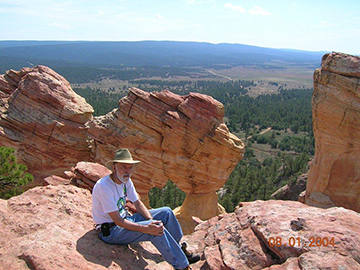
David J. Weber Series in New Borderlands History

In honor and memory of the work of the late David J. Weber, the Clements Center is pleased to announce a new book series in collaboration with the University of North Carolina Press which explores boundaries and borderlands. The series focuses on contested boundaries and the intercultural dynamics surrounding them, from the pre-contact era to the present, and includes projects across a wide range of time and space, within North America and beyond, including the Atlantic and Pacific world. Books in the series use innovative methods and concepts to examine, analyze, and interpret both sets of North American border regions as well as other areas connected to processes of making, crossing, and breaking borders worldwide. The Center subvents the publication of all series volumes. For more about the series and the partnership between the Clements Center and UNC Press, please click here.
Co-editors:
Andrew R. Graybill
Benjamin H. Johnson
Editorial Board:
Juliana Barr
Sarah Carter
Maurice Crandall
Ruben Flores
Kelly Lytle Hernandez
S. Deborah Kang
Cynthia Radding
Samuel Truett
In order of publication, volumes published or under contract:
Elliott Young, Alien Nation: Chinese Migration in the Americas from the Coolie Era through World War II (2014) Honorable Mention for the Luciano Tomassini Latin American International Relations Book Award
Michel Hogue, Metis and the Medicine Line: Creating a Border and Dividing a People (2015) Winner of the Stubbendieck Great Plains Distinguished Book Prize and the Clio Prize
Andrew J. Torget, Seeds of Empire: Cotton, Slavery, and the Transformation of the Texas Borderlands, 1800-1850 (2015) Winner of the David J. Weber Prize, the William M. LeoGrande Prize, the Ramirez Family Award, the Coral Horton Tullis Memorial Prize, the Kate Broocks Bates Award, the Ottis G. Lock Prize, the Summerfield G. Roberts Award, the Catherine Munson Foster Memorial Award, the San Antonio Conservation Society Publication Award, and the Texas Old Missions and Forest Restoration Award
John Weber, From South Texas to the Nation: The Exploitation of Mexican Labor in the Twentieth Century (2015) Finalist for the David J. Weber Prize
Holly M. Karibo, Sin City North: Sex, Drugs, and Citizenship in the Detroit-Windsor Borderland (2015) Winner of the Michigan Historical Society State History Award
Julie M. Weise, Corazón de Dixie: Mexicanos in the U.S. South since 1910 (2015) Winner of the Merle Curti Award and the CLR James Award
Mireya Loza, Defiant Braceros: How Migrant Workers Fought for Racial, Sexual, and Political Freedom (2016) Winner of the Theodore Saloutos Book Award and the Smithsonian Secretary's Research Prize
Julian Lim, Porous Borders: Multiracial Migrations and the Law in the U.S.-Mexico Borderlands (2017) Winner of the Association for Asian American Studies Award and the David J. Weber Prize
Gina M. Martino, Women at War in the Borderlands of the Early American Northeast (2018)
Miroslava Chavez-Garcia, Migrant Longing: Letter Writing Across the U.S.-Mexico Borderlands (2018) Winner of the Barbara "Penny" Kanner Award, A Choice Outstanding Academic Title
Jessica M. Kim, Imperial Metropolis: Los Angeles, Mexico, and the Borderlands of American Empire, 1865-1941 (2019) Winner of the Kenneth Jackson Urban History Award
Maurice Crandall, These People Have Always Been a Republic: Indigenous Electorates in the U.S.-Mexico Borderlands, 1598-1912 (2019) Winner of the Caughey Western History Association Prize and the David J. Weber Prize from the Western History Association, the Southwest Book Award from the Border Regional Library Association, and Honorable Mention for the Erminie Wheeler-Voegelin Book Award
Jeffrey Alan Erbig, Jr., Where Caciques and Mapmakers Met: Border-making in Eighteenth-century South America (2020) Finalist for the Spur Awards from the Western Writers of America
Ryan Hall, Beneath the Backbone of the World: Blackfoot People and the North American Borderlands, 1720-1877 (2020)
Kevin Waite, West of Slavery: The Southern Dream of a Transcontinental Empire (2021) Winner of the Wiley-Silver Prize from the Center for Civil War Research, and finalist for both the Gilder Lehrman Lincoln Prize and the Paul E. Lovejoy Prize
Andrew Torget and Gerardo Gurza-Lavalle, eds., These Ragged Edges: Histories of Violence At the U.S.-Mexico Border (2022)
Andrea Geiger, Converging Empires: Citizens and Subjects in the North Pacific Borderlands, 1867-1945 (2022)
Andrew Isenberg, “The Experimental Empire: Indians, Squatters, and Slaves in the North American Borderlands” (forthcoming)
Erika Pani, “Torn Asunder: The North American Republics at Mid-Century, 1848-1867” (forthcoming)
Katherine Massoth, “Keeping House: The Borders of Gender Roles, Cultural Practice, and Domesticity in Territorial New Mexico and Arizona” (forthcoming)
John Nelson, “Muddy Ground: Native Peoples, Europeans, and the Transformation of a Continent” (forthcoming)
Mark Dizon, “Reciprocal Mobilities: Movement and Friction in a Philippine Hinterland” (forthcoming)
Irvin Ibargüen, “Mitigation Nation: Mexico and its Struggle to Control US-Mexican Migration” (forthcoming)
Omar Valerio Jiménez, “Remembering Conquest: Mexican Americans, Memory, and Citizenship" (forthcoming)
Erin Kramer, “The Ancient House: Constructing Community in the Seventeenth-Century New York Borderlands” (forthcoming)
Eric Schlereth, “Quitting the Nation: Emigrant Rights in North America” (forthcoming)
Kyle Harvey, “In Place of Mobility: Migrants, Rebels, and Engineers in a Nineteenth-Century Argentine-Chilean Borderland” (forthcoming)